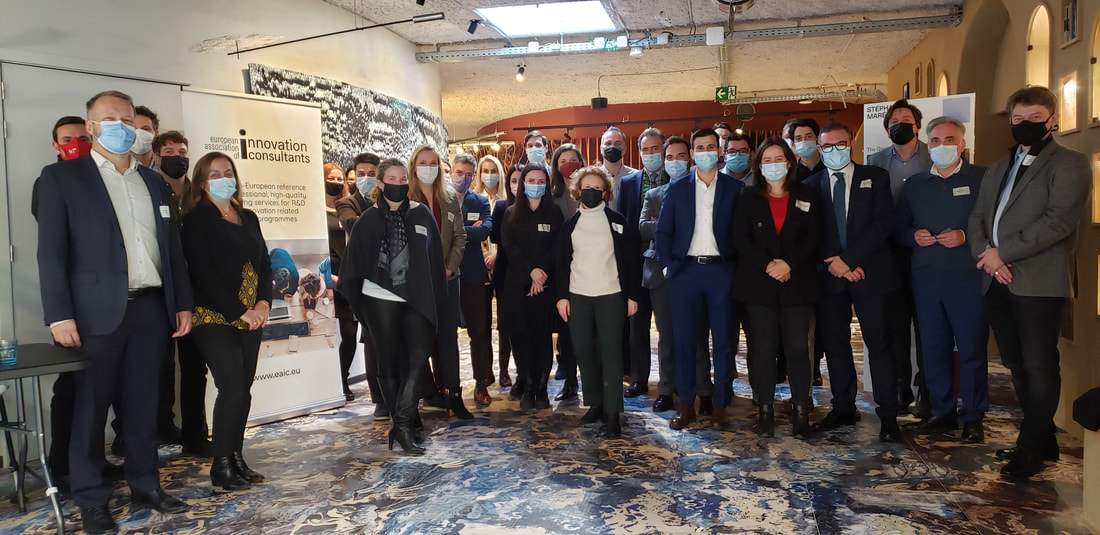News |
|
We're pleased to welcome three of our newest members:
Konnekto (Belgium) supports organisations with subsidy consultancy and writing high-quality proposals for regional, national and European subsidy applications. Konnekto has expertise in several domains such as AI, Blockchain, Health tech, circular economy etc. Their main customers are SMEs and large companies. Konnekto has a broad network within the public sector and encourages cooperation with universities and other knowledge/industry partners. enco (Italy) is specialised in consulting services, aimed at helping companies in transforming innovative ideas into successful projects. ENCO supports the consortium in the proposal writing and submission. Furthermore, ENCO participates in national and international R&D&I projects, acting as exploitation and innovation manager, responsible for the development of market analysis, business plan, innovation management plan, IPR, exploitation – dissemination and communication plan and strategies. Iceberg plus (Romania) has over 10 years of experience in project writing and implementation. They have four main working areas such as Funding and Project Management, Strategies & Innovation, Training & E-learning and Assistance in the Public Governance System. Innovation is the heart of Iceberg's culture. View our full list of members here.
0 Comments
Consultants play an important role in applying for European funding. Often, the funding programmes happen to be so specific that it is difficult for potential applicants to deal with all the aspects, from formalities such as entering data into portals, to interpreting the guidelines correctly. Nevertheless, some European Executive Agencies are skeptical when it comes to consultants. This is partly because of certain prejudices. An “advisor” is not a protected professional title like a “notary” or an “auditor.” Anyone can call themself a consultant, and therefore, it’s possible to encounter underqualified professional or even an imposter who has very little in common with the qualifications and expertise of the reputable consultants. Those consultants sometimes charge exaggerated fees for their services that lack expertise and knowledge. By doing so, those few pretenders create a bias toward the consultancy services and consultants in general. Qualified consultants work under umbrella organizations, such as the EAIC, which apply strict standards through specific criteria set (see EAIC’s Code of Conduct for mor details). In most cases, they also work with a success component when it comes to producing applications and share some of their clients' risk. Many NCPs are in direct contact with consultants, which means that knowledge is shared in both directions. Client companies benefit from this collaboration, being provided with the latest information. Companies that hire consultants to apply for funding benefit from being relieved of the burden of time-consuming technicalities during the proposal preparation and application processes, receiving the necessary expertise externally. Consultants provide added-value to their clients but to executive agencies as well. They act as multipliers, enabling more companies to apply for funding, rather than relying solely on the results of the executive agencies’ communication activities. In addition, consultants also help filtering out the best projects as they usually support promising projects that have the most potential to succeed. This prevents the flood of irrelevant or inappropriate applications making it easier for executive agencies, which therefore can be more efficient focusing their time and energy to the most promising proposals. Therefore, a dynamic collaboration between the EU Executive Agencies and consultants should be strongly encouraged for the mutual gains. Developing well-established partnership in those terms would certainly benefit all stakeholders and increase Europe’s global competitiveness. Article courtesy of EAIC member Dorucon EAIC members gathered last week, in Brussels, for the first ever in-person meeting held by the European Association of Innovation Consultants. Members of the Association met on the 23rd of November for a full day of workshops: 40 participants came to Brussels and over 20 others connected online to the various sessions organised by the Association.
The purpose of the meeting was to invite EAIC members to co-create and prepare the Association's action plan for next year. For the past 2 years, meetings were held online, mainly because of the sanitary crisis, but it was time for a physical meeting to be held to allow for more fruitful discussions and to provide the possibility for members to meet. The meeting was held the day prior to the EIC Summit, attended by many EAIC members. The EIC Accelerator has been a focal point of attention of the association for over the past year, and hence, it was the ideal time to organise this gathering. Opening the event, Pekka Koponen, President of the EAIC, recalled some of the Association's most important achievements over the past 2 years, such as: the promotion of a Manifesto on professional project management, the adoption of a code of conduct, a constructive dialogue established with the EIC, the publication of our collective NGEU guide, strong visibility of the Association thanks to dynamic communication, the hiring of a Secretary General, Marie Latour, since October. Diego Soro, EAIC Board Member, presented the current membership structure and the objectives for growth for next year to ensure presence in all EU Member States; EAIC members are currently present in 25 European countries, of which 18 are EU Member States. Yiannis Geragotellis presented the results of an internal survey on new initiatives and project collaboration. 7 parallel sessions were held, in line with most of the EAIC’s active working groups, each of these led by one or several board members:
Each working group defined its objectives, a work plan, various KPIs and their budget for next year. In the final and closing session, all the leaders of the working groups presented the progress made and reported what had been discussed in the parallel sessions. The complete and consolidated action plan will be presented to all members of the Association in the beginning of January 2022, in the monthly members' meeting. It was a very productive gathering and networking was encouraged among members, who were able to share their experiences and concerns. |
Categories
All
Archives
July 2024
|




 RSS Feed
RSS Feed
